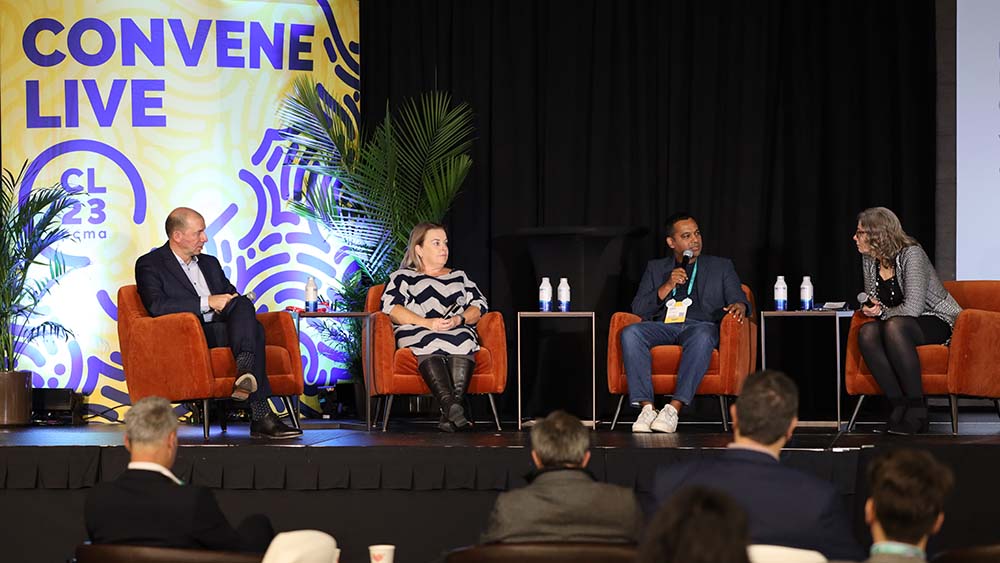
Panos Tzivanidis, director of corporate events and services for the International Olympic Committee; Paula Rowntree, head of events for the Australian Psychological Society, and Veemal Gungadin, CEO of GEVME, discuss the challenges facing business events with Convene Editor in Chief Michelle Russell at Convening Leaders 2023. (Whatever Media Group)
In March, a New York Times opinion piece posed the question: What if the next pandemic happens tomorrow? The “next pandemic” is called “Disease X” by the World Health Organization — an unknown, currently nonexistent illness that may differ from COVID-19 and require a different type of response. Convene’s Editor in Chief Michelle Russell asked a similar question during a Convene Live discussion at CL 2023, held in Columbus in early January, to three events leaders: Panos Tzivanidis, director of corporate events and services for the International Olympic Committee; Veemal Gungadin, CEO of event management software Gevme; and Paula Rowntree, head of events for the Australian Psychological Society: Is the events industry ready for the next pandemic? The three individuals zeroed in on how event technology could make or break events in this hypothetical scenario.
“Yes, I think that we are ready,” said Tzivanidis. “I don’t believe we have found the perfect solution, but we have the tools,” he said, referring the digital leaps the industry took at the height of COVID.
Gungadin agreed, noting that the industry is in a “much better position” with managing work remotely due to the pandemic. “What happened during the pandemic is almost every company just had to react and then figure out how to get things done,” Gungadin said. “And if you put the event aside itself, the first thing to tackle was, ‘How do we work remotely?’ Many companies were not suited for that, be it small companies or large agencies.”
Now, Gungadin said, almost every company knows how to function remotely. “From a remote collaboration perspective, I think we are already at a stage where, as companies and as individuals, we’re better prepared.”
Event technology, Gungadin said, is also next-pandemic-proof, largely due to the reactionary growth of digital events during lockdowns that felt like “the Wild West,” he said. “There was this massive experimentation that went on like, what was a virtual event? What is a hybrid event? Is it synchronous, asynchronous? Is it hub and spokes? So there have been a lot of case studies now.” While technology continues to improve, there is “lots of history we can already leverage on,” he said.
Rowntree added that she would like to see event organizers approach technology differently if another pandemic were to happen. “To a degree, we almost sat back and waited for the technology to come to us,” she said, noting that planners waited for event technology companies to design solutions with little collaboration between planners and tech experts. “One of the things we saw that I didn’t think worked too well was engagement in the virtual world,” Rowntree said. “If another pandemic comes, are our attendees going to be able to get back into that mindset? Or are they just going to go, ‘It wasn’t engaging before; I don’t want to engage this time.’”
Rowntree encouraged event planners to come up with solutions of their own to discover what “lively, active virtual engagement” can look like and how they can better work alongside technology partners in this scenario “to actually build that for us,” she said. “Just so that we’re in that driver’s seat a little bit more, because we know our delegates better than anybody.”
Casey Gale is managing editor of Convene.
